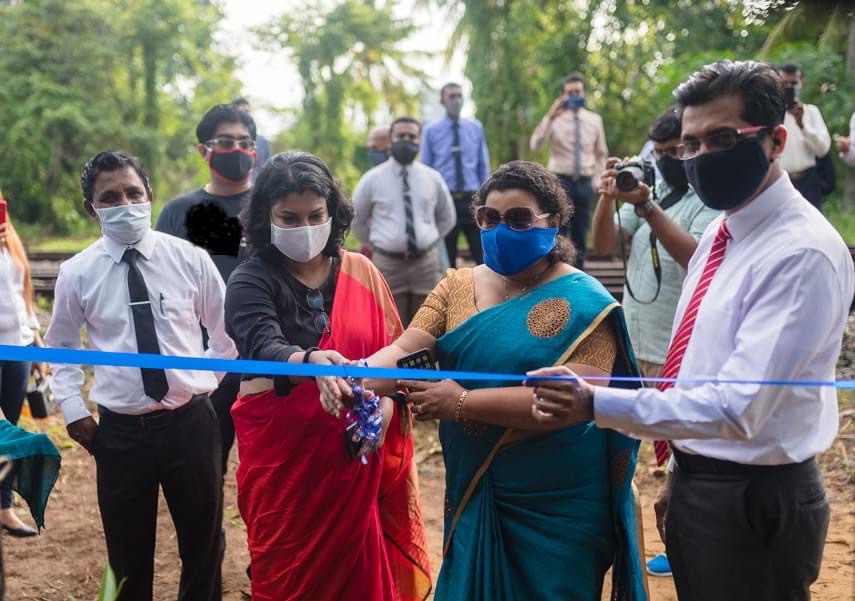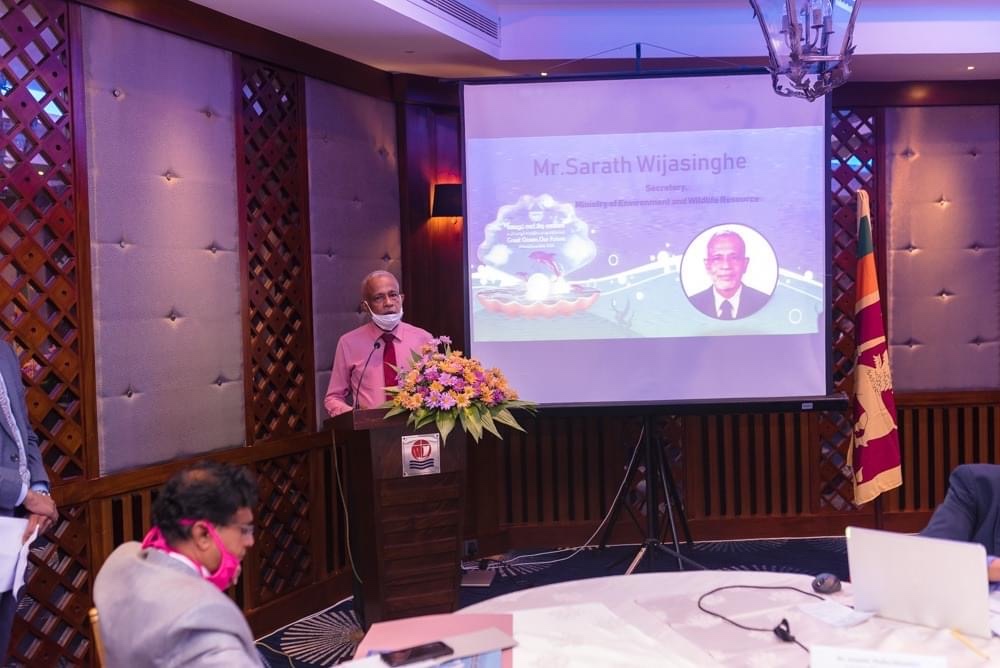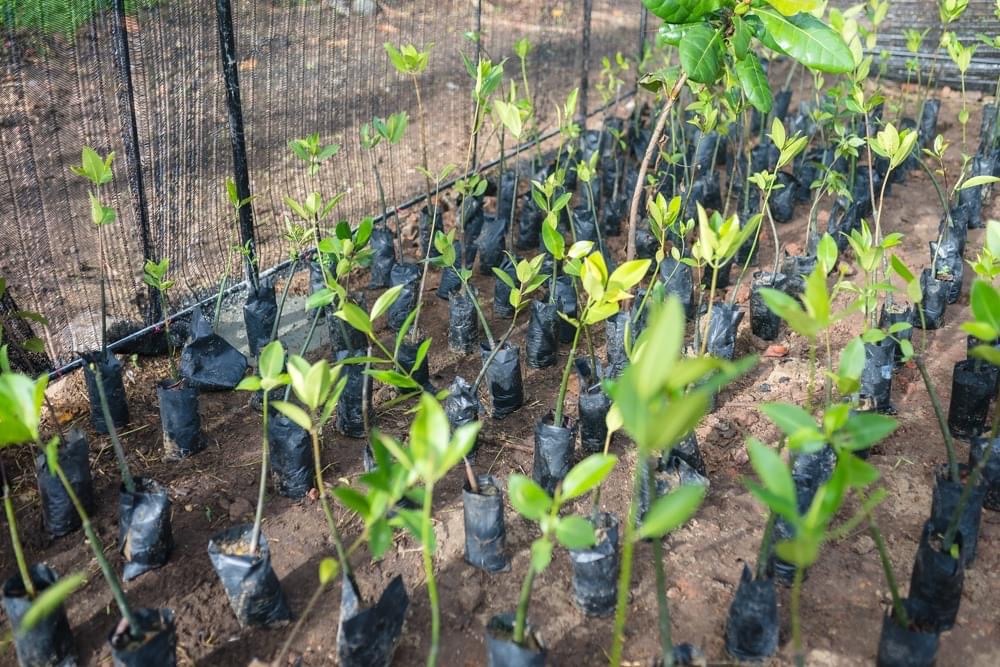On World Oceans Day on June 08, 2020, the Marine Environment Protection Authority (MEPA) of the Ministry of Environment and Wildlife Resources of Sri Lanka in collaboration with SLYCAN Trust organised a roundtable discussion and opening of a mangrove nursery in Kalutara, Sri Lanka.

According to data from the presenters, disposal of solid waste into roads, rivers, canals and seas is 40% and the solid waste composition contributing to coastal pollution is 95% of marine debris generated locally. Of this, nearly 98% is plastic waste and the total amount of solid waste collected by local authorities is 60%. This is not taking into account the pollution caused by the fisheries sector especially in the areas of wastewater discharge caused by the dry fish processing industry and pollution caused by commercial and fishery harbours.
Fifty participants of the roundtable discussion were identified as key multi-stakeholders working on coastal and marine ecosystems, waste management, pollution control, and climate change in Sri Lanka. Given below are extracts from a few of their presentations.
Speaking on ocean-based renewable energy sector development and combination for Blue Economy, Sri Lanka Sustainable Energy Authority Chairman Ranjith Sepala highlighted that as part of the Authority’s mission it was in its purview to identify and develop natural resources, publish energy development areas and implement energy-efficient activities. In this light, Sepala noted that wave energy generators being a way forward in order to achieve the goals set outs; to have in place ocean thermal generators in Trincomalee and for universities to research the suitability and sustainability of innovative technology.

Expanding on the topic of ocean-based Blue Economy and knowledge-based development to ensure sustainability, University of Ruhuna Vice Chancellor Prof Sujeewa Amarasena explained that that the on-campus educational institute provided specific information and courses on fisheries, biology and aquaculture, coastal environment, environmental chemistry among others. Amarasena also noted that the University was in fact equipped to provide resources and data for fishermen on fishing patterns and the best fishing spots to increase the efficiency of their catches through their research institute that collated physical oceanography data for the industry, weather information and also outcomes from the research conducted through collaborations with many other countries as well.
Dimal Fernando of the Central Environment Authority (CEA) explained that the Authority provided the approval for both private and governmental development projects to ensure that an environmental protection licence is given a month before a development project began. He went on to say that a schedule-based management licence can be given to manage the discharge of waste from the beginning of the process right up until disposal.

Fernando also noted that the current structure of the environment monitoring system as not sound. While the level of intervention/activities will be restricted depending on the environmental impacts, there is a lack of post-monitoring for Environmental Protection Areas (EPAs) and compliance monitoring systems that need to be improved.
The representative from the CEA also pointed out that Municipal Councils as the primary authority holds responsibility for soil management of which, 137 local authorities have made compost waste management a common practice.
Speaking on the research and development requirement for a future ocean-based economy the National Aquatic Resources Research and Development Agency (NARA) explained that NARA as the responsible agency to hold satellite real-time data for fishing ground forecasting. The representative went on to say that more research was needed on marine species, especially on invasive species and highlighted the importance of blue carbon and carbon degrading, especially in the area of mangroves for value addition of products. NARA also brought to the discussion the importance of sustainable energy such as wave energy and on how the impacts on fisheries from pollution, marine sector medicine and ocean bed disasters should be explored more than what is already happening on the ground.

The Deputy Inspector General of Police in Western Province Deshabandu Tennakoon in his presentation provided a brief on the mobilised police environment units and the awareness programmes created to generate curiosity on environment-related issues. Moreover, he also explained the Police’s role in assisting the Municipalities by supervising garbage collections and cleaning and also their role in assisting the government to remove waste.

The roundtable discussion brought to light a number of areas of dialogue including the government environment policy, ocean-based renewable energy sector development and combination for the blue economy, coastal and marine-related tourism prospects, opportunities for the development of coastal and marine aquaculture, coastal sector development, sustainable innovative measures, global warming and environmental issues etc.
SLYCAN Trust is a non-profit think tank. It has been a registered legal entity in the form of a trust since 2016, and a guarantee limited company since 2019. The entities focus on the thematic areas of climate change, adaptation and resilience, sustainable development, environmental conservation and restoration, social justice, and animal welfare. SLYCAN Trust’s activities include legal and policy research, education and awareness creation, capacity building and training, and implementation of ground level action. SLYCAN Trust aims to facilitate and contribute to multi-stakeholder driven, inclusive and participatory actions for a sustainable and resilient future for all.
On World Oceans Day on June 08, 2020, the Marine Environment Protection Authority (MEPA) of the Ministry of Environment and Wildlife Resources of Sri Lanka in collaboration with SLYCAN Trust organised a roundtable discussion and opening of a mangrove nursery in Kalutara, Sri Lanka.

According to data from the presenters, disposal of solid waste into roads, rivers, canals and seas is 40% and the solid waste composition contributing to coastal pollution is 95% of marine debris generated locally. Of this, nearly 98% is plastic waste and the total amount of solid waste collected by local authorities is 60%. This is not taking into account the pollution caused by the fisheries sector especially in the areas of wastewater discharge caused by the dry fish processing industry and pollution caused by commercial and fishery harbours.
Fifty participants of the roundtable discussion were identified as key multi-stakeholders working on coastal and marine ecosystems, waste management, pollution control, and climate change in Sri Lanka. Given below are extracts from a few of their presentations.
Speaking on ocean-based renewable energy sector development and combination for Blue Economy, Sri Lanka Sustainable Energy Authority Chairman Ranjith Sepala highlighted that as part of the Authority’s mission it was in its purview to identify and develop natural resources, publish energy development areas and implement energy-efficient activities. In this light, Sepala noted that wave energy generators being a way forward in order to achieve the goals set outs; to have in place ocean thermal generators in Trincomalee and for universities to research the suitability and sustainability of innovative technology.

Expanding on the topic of ocean-based Blue Economy and knowledge-based development to ensure sustainability, University of Ruhuna Vice Chancellor Prof Sujeewa Amarasena explained that that the on-campus educational institute provided specific information and courses on fisheries, biology and aquaculture, coastal environment, environmental chemistry among others. Amarasena also noted that the University was in fact equipped to provide resources and data for fishermen on fishing patterns and the best fishing spots to increase the efficiency of their catches through their research institute that collated physical oceanography data for the industry, weather information and also outcomes from the research conducted through collaborations with many other countries as well.
Dimal Fernando of the Central Environment Authority (CEA) explained that the Authority provided the approval for both private and governmental development projects to ensure that an environmental protection licence is given a month before a development project began. He went on to say that a schedule-based management licence can be given to manage the discharge of waste from the beginning of the process right up until disposal.

Fernando also noted that the current structure of the environment monitoring system as not sound. While the level of intervention/activities will be restricted depending on the environmental impacts, there is a lack of post-monitoring for Environmental Protection Areas (EPAs) and compliance monitoring systems that need to be improved.
The representative from the CEA also pointed out that Municipal Councils as the primary authority holds responsibility for soil management of which, 137 local authorities have made compost waste management a common practice.
Speaking on the research and development requirement for a future ocean-based economy the National Aquatic Resources Research and Development Agency (NARA) explained that NARA as the responsible agency to hold satellite real-time data for fishing ground forecasting. The representative went on to say that more research was needed on marine species, especially on invasive species and highlighted the importance of blue carbon and carbon degrading, especially in the area of mangroves for value addition of products. NARA also brought to the discussion the importance of sustainable energy such as wave energy and on how the impacts on fisheries from pollution, marine sector medicine and ocean bed disasters should be explored more than what is already happening on the ground.

The Deputy Inspector General of Police in Western Province Deshabandu Tennakoon in his presentation provided a brief on the mobilised police environment units and the awareness programmes created to generate curiosity on environment-related issues. Moreover, he also explained the Police’s role in assisting the Municipalities by supervising garbage collections and cleaning and also their role in assisting the government to remove waste.

The roundtable discussion brought to light a number of areas of dialogue including the government environment policy, ocean-based renewable energy sector development and combination for the blue economy, coastal and marine-related tourism prospects, opportunities for the development of coastal and marine aquaculture, coastal sector development, sustainable innovative measures, global warming and environmental issues etc.